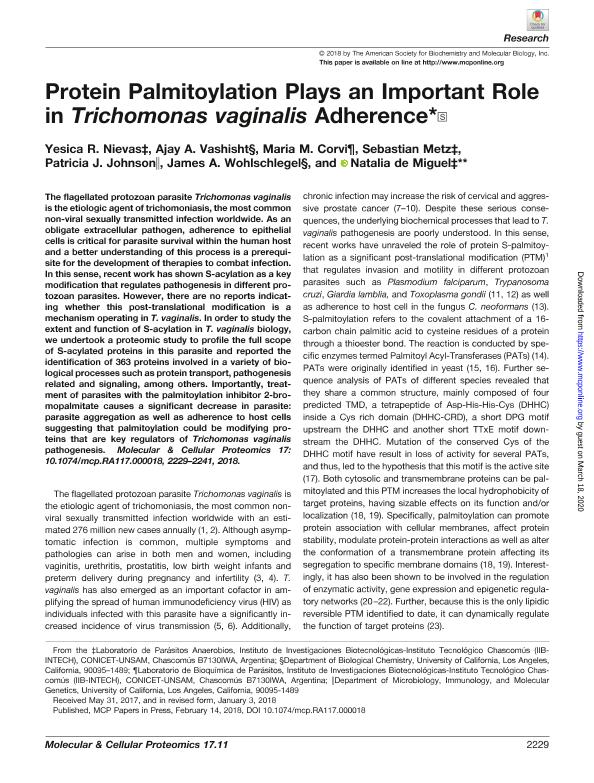Mostrar el registro sencillo del ítem
dc.contributor.author
Nievas, Yésica Romina

dc.contributor.author
Vashisht, Ajay A.
dc.contributor.author
Corvi, Maria Martha

dc.contributor.author
Metz, Sebastián Darío

dc.contributor.author
Johnson, Patricia J
dc.contributor.author
Wohlschlegel, James A.
dc.contributor.author
de Miguel, Natalia

dc.date.available
2020-03-18T15:17:17Z
dc.date.issued
2018-11
dc.identifier.citation
Nievas, Yésica Romina; Vashisht, Ajay A.; Corvi, Maria Martha; Metz, Sebastián Darío; Johnson, Patricia J; et al.; Protein palmitoylation plays an important role in Trichomonas vaginalis adherence; American Society for Biochemistry and Molecular Biology; Molecular & Cellular Proteomics; 17; 11; 11-2018; 2229-2241
dc.identifier.issn
1535-9476
dc.identifier.uri
http://hdl.handle.net/11336/100014
dc.description.abstract
The flagellated protozoan parasite Trichomonas vaginalis is the etiologic agent of trichomoniasis, the most common non-viral sexually transmitted infection worldwide. As an obligate extracellular pathogen, adherence to epithelial cells is critical for parasite survival within the human host and a better understanding of this process is a prerequisite for the development of therapies to combat infection. In this sense, recent work has shown S-acylation as a key modification that regulates pathogenesis in different protozoan parasites. However, there are no reports indicating whether this post-translational modification is a mechanism operating in T. vaginalis. In order to study the extent and function of S-acylation in T. vaginalis biology, we undertook a proteomic study to profile the full scope of S-acylated proteins in this parasite and reported the identification of 363 proteins involved in a variety of biological processes such as protein transport, pathogenesis related and signaling, among others. Importantly, treatment of parasites with the palmitoylation inhibitor 2-bromopalmitate causes a significant decrease in parasite: Parasite aggregation as well as adherence to host cells suggesting that palmitoylation could be modifying proteins that are key regulators of Trichomonas vaginalis pathogenesis.
dc.format
application/pdf
dc.language.iso
eng
dc.publisher
American Society for Biochemistry and Molecular Biology

dc.rights
info:eu-repo/semantics/openAccess
dc.rights.uri
https://creativecommons.org/licenses/by-nc-sa/2.5/ar/
dc.subject
CELL ADHESION
dc.subject
HOST-PATHOGEN INTERACTION
dc.subject
PALMITOILATION
dc.subject
PARASITE
dc.subject.classification
Parasitología

dc.subject.classification
Ciencias de la Salud

dc.subject.classification
CIENCIAS MÉDICAS Y DE LA SALUD

dc.title
Protein palmitoylation plays an important role in Trichomonas vaginalis adherence
dc.type
info:eu-repo/semantics/article
dc.type
info:ar-repo/semantics/artículo
dc.type
info:eu-repo/semantics/publishedVersion
dc.date.updated
2020-03-12T18:45:49Z
dc.journal.volume
17
dc.journal.number
11
dc.journal.pagination
2229-2241
dc.journal.pais
Estados Unidos

dc.journal.ciudad
Bethesda
dc.description.fil
Fil: Nievas, Yésica Romina. Consejo Nacional de Investigaciones Científicas y Técnicas. Centro Científico Tecnológico Conicet - La Plata. Instituto de Investigaciones Biotecnológicas. Instituto de Investigaciones Biotecnológicas "Dr. Raúl Alfonsín" (sede Chascomús). Universidad Nacional de San Martín. Instituto de Investigaciones Biotecnológicas. Instituto de Investigaciones Biotecnológicas "Dr. Raúl Alfonsín" (sede Chascomús); Argentina
dc.description.fil
Fil: Vashisht, Ajay A.. University of California; Estados Unidos
dc.description.fil
Fil: Corvi, Maria Martha. Consejo Nacional de Investigaciones Científicas y Técnicas. Centro Científico Tecnológico Conicet - La Plata. Instituto de Investigaciones Biotecnológicas. Instituto de Investigaciones Biotecnológicas "Dr. Raúl Alfonsín" (sede Chascomús). Universidad Nacional de San Martín. Instituto de Investigaciones Biotecnológicas. Instituto de Investigaciones Biotecnológicas "Dr. Raúl Alfonsín" (sede Chascomús); Argentina
dc.description.fil
Fil: Metz, Sebastián Darío. Consejo Nacional de Investigaciones Científicas y Técnicas. Centro Científico Tecnológico Conicet - La Plata. Instituto de Investigaciones Biotecnológicas. Instituto de Investigaciones Biotecnológicas "Dr. Raúl Alfonsín" (sede Chascomús). Universidad Nacional de San Martín. Instituto de Investigaciones Biotecnológicas. Instituto de Investigaciones Biotecnológicas "Dr. Raúl Alfonsín" (sede Chascomús); Argentina
dc.description.fil
Fil: Johnson, Patricia J. University of California; Estados Unidos
dc.description.fil
Fil: Wohlschlegel, James A.. University of California; Estados Unidos
dc.description.fil
Fil: de Miguel, Natalia. Consejo Nacional de Investigaciones Científicas y Técnicas. Centro Científico Tecnológico Conicet - La Plata. Instituto de Investigaciones Biotecnológicas. Instituto de Investigaciones Biotecnológicas "Dr. Raúl Alfonsín" (sede Chascomús). Universidad Nacional de San Martín. Instituto de Investigaciones Biotecnológicas. Instituto de Investigaciones Biotecnológicas "Dr. Raúl Alfonsín" (sede Chascomús); Argentina
dc.journal.title
Molecular & Cellular Proteomics

dc.relation.alternativeid
info:eu-repo/semantics/altIdentifier/url/http://www.mcponline.org/lookup/doi/10.1074/mcp.RA117.000018
dc.relation.alternativeid
info:eu-repo/semantics/altIdentifier/doi/https://doi.org/10.1074/mcp.RA117.000018
Archivos asociados
